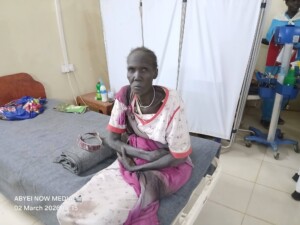Inflation, forex rates continue to rise in Sudan amid rumours about a new currency
The annual inflation rate for December recorded 269.33 per cent compared to 254.34 in November. The US Dollar rate on the parallel market in Khartoum jumped to SDG 275 yesterday. Acute food insecurity will remain high in several parts of Sudan in the coming months.
 Food insecurity in Sudan in Dec 2020-Jan 2021 (fews.net)
Food insecurity in Sudan in Dec 2020-Jan 2021 (fews.net)
The annual inflation rate for December recorded 269.33 per cent compared to 254.34 in November. The US Dollar rate on the parallel market in Khartoum jumped to SDG 275 yesterday. Acute food insecurity will remain high in several parts of Sudan in the coming months.
Sudan’s Central Bureau of Statistics reported yesterday that the annual inflation rate increased by 14.99 per cent in December. The average inflation rates in 2020 amounted to 163.26 per cent compared to 51 per cent in 2019, an increase of 112 per cent.
The inflation rate for the Food and Beverage Group was 206.44 per cent in December compared to 203.13 per cent in November, while the inflation rate for imported goods in the so-called Consumer Basket reached 194.42 per cent in December compared to 181.70 per cent the month before.
Currencies
Though Sudan has been removed from the US sanctions list in December last year, offered the possibility to liquidate its debt arrears at the World Bank, and signed an agreement on a $1 billion loan on Friday, the economic situation is still deteriorating – which is also reflected in the forex rates.
The rates at the parallel market in Khartoum jumped to an unprecedented high level this morning. On Monday, the greenback sold for SDG 266 on the parallel market, but this morning, people had to pay between between SDG 273 and 276 for a Dollar – while the official Dollar rate remained SDG 55.
There is allegedly a strong possibility that the current Sudanese currency may be changed in the future.
A member of the Economic Committee of the Forces for Freedom and Change told Sudan Tribune on Wednesday that “all concerned parties have emphasised” the necessity of changing the Sudanese currency.
“Discussions on this matter took place during the meetings of the High Budget Committee during the past days, in which the parties, including the Central Bank of Sudan and the Ministry of Finance agreed that there is a need to issue a new currency, but when and how is this not specified,” he said.
Food insecurity
The extremely high food prices and below-average household purchasing power will continue driving above-average assistance needs through May 2021, the Sudan Famine Early Warning Systems Network (FEWS NET) reported in its Sudan outlook update of December last year.
“Although the harvest is improving food security outcomes among poor rural households, the number of households facing Crisis (IPC Phase 3) or worse acute food insecurity will remain high, particularly among displaced people, refugees, and urban poor households,” the report reads.
The ongoing harvest of the 2020/21 season is constrained by a combination of high prices and shortages of labour, fuel, inputs, and transportation, FEWS NET, a department of USAID, warns. “The sesame and groundnut harvest has been completed in the semi-mechanized and traditional sectors.
Cereal and other cash crops harvests are still underway and expected to continue through January. Delays due to the shortages and high prices are likely to drive above-average pre-harvest losses”.
According to FEWS NET, the atypically continuing increase in staple food prices during the harvest period of November/December last year is mainly due to “the extremely high production costs, delayed harvest, and the continued depreciation of the Sudanese Pound”.
In December, sorghum and millet prices increased 10-20 percent and remained 240-300 percent higher than respective 2019 prices and seven times above the five-year average.
Radio Dabanga’s editorial independence means that we can continue to provide factual updates about political developments to Sudanese and international actors, educate people about how to avoid outbreaks of infectious diseases, and provide a window to the world for those in all corners of Sudan. Support Radio Dabanga for as little as €2.50, the equivalent of a cup of coffee.












 and then
and then